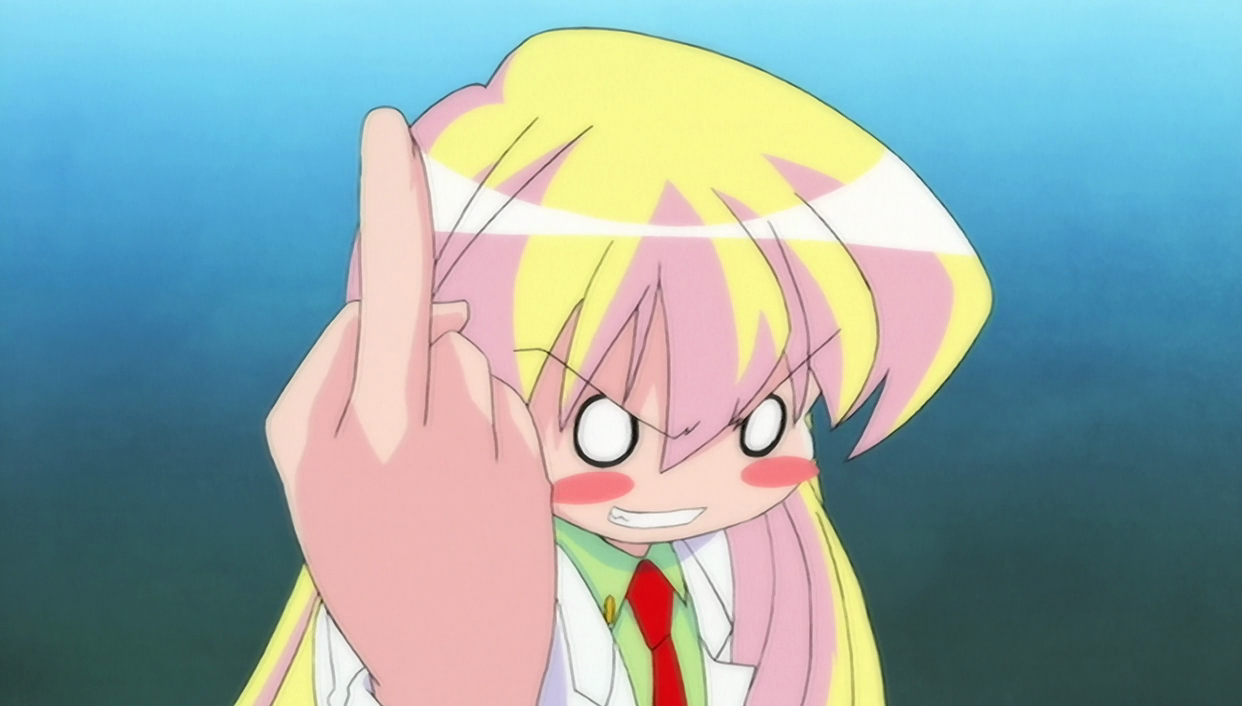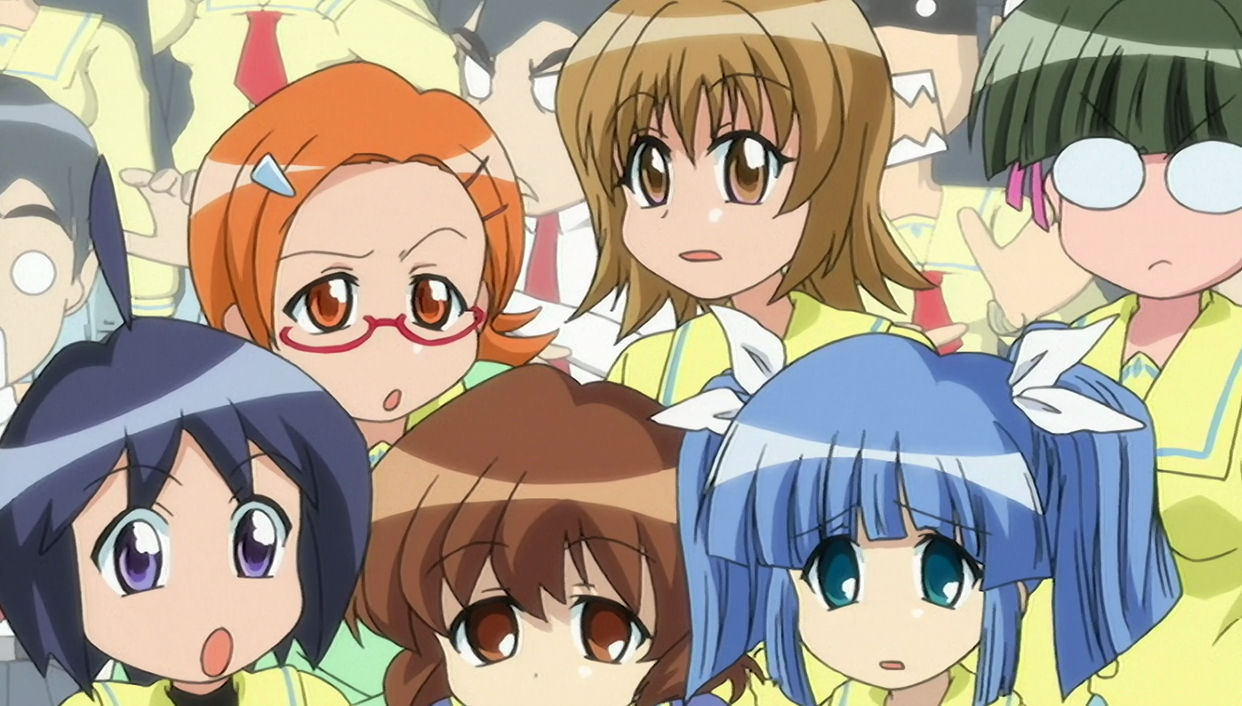| Top | Introduction | About Author | Characters | Anime | Music | Extra | Links |
What is Pani Poni Dash?Pani Poni Dash is a 2005 anime produced by Shaft (and Gansis) and was directed by renowned Akiyuki Shinbo (Zetsubou-Sensei, Monogatari, Madoka) and Shin Oonuma (ef, WataMote, Prism Illya). It's an adaptation of the Hekiru Hikawa manga Pani Poni, released from 2000 to 2011. At its core, it's a gag and slapstick comedy, but also a parody of high school life and anime media stereotypes. To give a sense of what it feels like to watch it, it's unapologetically anime. It celebrates anime visual styles and otaku culture, and acknowledges how ridiculous it can get. At first glance, it can look like your typical CGDCT moeblob anime, but as you keep watching it, you'll see many elements that make PPD stand out.   The story of surrounds around 11-year-old Rebecca "Becky" Miyamoto, who starts as the homeroom teacher of 1-C Class at Momotsuki Academy. There, she meets the energetic Himeko, harsh Rei, non-existent Kurumi, bookworm Miyako, eccentric Ichijou and good girl Sayaka, also know as Number 6. Despite her young age and small posture, Becky can stand up to herself and can her students with an iron fist. The other classes and teachers of 1st year in the school often make appearances throughout the anime, but the episodes focus mainly on the main six heroines and Becky. Not to forget other recurring characters in PPD, such as Lord Cat, Giant Salamander and Aliens. Each character has a gimmick or a repeating joke that creates comedic moments through character interaction. Every episode in the anime has a specific setting and a story it follows throughout the air time. Episodes can have sub-plots that are related to characters' gimmick or can even reference their relation to another work by Hekiru Hikawa. For example, Becky's miserable pet rabbit Mesousa gets into misfortune in every episode, whether it was because of the other main characters or the Lord Cat living inside a vending machine. Sub-plots don't break the flow of the episodes and sometimes are justified by the nature of the episode. In the original manga, in many occasions, Becky is accompanied with students from other classes than her own. The manga focuses in several characters instead of the main ones in anime. Some of important characters and storylines were cut from the anime. For example, the senior student characters were just briefly mentioned and the whole story arc where Becky goes to elementary school were cut. It was a compromission made to make the anime narrative feel coherent. Hence, the title isn't Pani Poni, but Pani Poni DASH. Despite it, you can enjoy the anime as its own story and keep it separated from the manga. PPD is a Shaft anime, but doesn't have similar visual style as 2010s Shaft anime, such as Monogatari and Madoka. PPD shares a lot of similarities with the Tsukuyomi: Moon Phase anime (2004-2005), which was director Akiyuki Shinbo's and storyboard artist Tatsuya Oishi's debut work in Shaft. Both works have the same visual style elements and character designs, which are carried by the main character designer, Kazuhiro Oota. However, colourful and cheery style in PPD is a huge contrast to dark and aesthetic style of Tsukuyomi. Most of the visual direction in Tsukuyomi was carried by Nobuyuki Takeuchi, who was influenced by Revolutionary Girl Utena's art style while working with it. Shinbo used similar stylistic elements in PPD as well, but the main emphasis of PPD were the play with colours and environment. Tatsuya Oishi, later known for his direction work with Monogatari, contributed to PPD's anime with creating opening animation and eye catchers. PPD was a joint effort of all Shaft staff members. Staff was free to implement their own ideas during anime production, which made the anime full of different jokes and allusions. This was when the term "Pani Poni'ish" (Pani Poni rashii) was created. In the anime's context, it means something that's "out of place, yet oddly fitting for the situation". These visual style choices and elements continued to be implemented in future Shaft works, such as Negima!?, Zetsubou-Sensei and Maria Holic. (You could even say Negima!? is the spiritual successor of PPD, as both have similar style of comedy and aesthetics) Similar to how references stayed as a staple joke in Shaft anime. PPD created concrete outlines for Shaft style that would come into full fruition in later Shaft anime. Comedy in PPD is slapstick-heavy, alongside the situation comedy playing with the characters' personalities. But it isn't similar to your average anime situation comedy like Gintama, Lucky Star or Nichijou. The comedy is more similar to Austin Powers, Monty Python and The Naked Gun movies. In anime context, closest examples would be Azumanga Daioh, Excel Saga and Nurse Witch Komugi. The comedy in PPD is based on visual gags, additional background jokes and parodying famous and not-so-famous parts of otaku culture. Especially the fast-paced editing and cut-outs enhance how the jokes and references can fly over the head, as if you're not meant to notice them. PPD does contain a lot of fan service, but the actual jokes almost never focus especially in pervy or sexual stuff, and the lewd stuff is on screen just for mere seconds. PPD is famous for parodying anime troupes and popular culture. The characters are parodies as well, especially parodies to visual novel characters at the time. For example, Mesousa is a parody of cheerful pet sidekicks, while Ichijou is an overexaggerated version of quiet and mysterious characters. It's clear Hikawa took inspiration from visual novel troupes, as he was a fan of them. Whole Roboko's character is a literal parody of android Multi from To Heart. Some of referenced anime and manga have influenced Pani Poni's world. For example, Azumanga Daioh has a child prodigy in high school, similar to Becky in Pani Poni, as well as Himeko's and Rei's duo dynamic is similar to "hostility" between Tomo and Yomi. Even though Pani Poni characters have clear origins and basis in Azumanga, it never feels like a rip-off. There's always something new Pani Poni (Dash) has to offer, which only enhances the characters' part in the story. Roboko is only one costume of the many Serizawa puts on. Not to mention how PPD takes characters and media references to a next level. Characters in PPD are often making references towards other works, or the works make a small cameo inside the episode, even if the reference is unrelated to the story. The references can just randomly appear. The animation and production staff were encouraged to add the things they liked to the anime, which can be seen as a mass variety of references towards old anime, visual novels and Western popular culture. They never feel like they're mandatory to know, and are rather easter eggs, instead of the main point of the joke. PPD's references are like small messages to the people who know the series and share the same love towards it. With all these references, PPD can be seen as a time capsule for old anime and otaku culture. PPD was released near the birth of modern anime classics, such as Haruhi, Death Note, Code Geass and Higurashi. All of them aired in 2006, which at the time shaped people's views on how they perceive anime and revolutionized the whole medium to a larger audience. It's as if PPD knew something big was going to happen. That's why the staff poured out a lot of references, before they were forgotten with new anime trends and otaku cultural phenomenon. Similar to how Lucky Star drops references and showcases otaku culture in post-Haruhi Japan, PPD showcases what otaku culture was in pre-Haruhi Japan. PPD has a special visual style and comedy that makes it stand out from the original manga. But I think there's a message in PPD that was implemented by director and writers of Dash. I kept it as spoiler-free as possible. Becky's background is heart-breaking. She studied and worked in MIT to get a degree, yet, she isn't happy about it. During her time in MIT, she isolated herself from other people to focus in studying. It's never told whether it was for her to prove herself to be more mature or her family background pressured her. Nonetheless, Becky acts very mature compared to her age, which she uses as an advantage in her teacher work and bosses over her students. It's only the times when she's afraid and laidback, when she breaks out of her role as a teacher and becomes a child appropriate to her age. But she doesn't want to be treated as a child and demands everyone else around her to reject their childish selves. However, Becky deep down doesn't want the everyday life as a high school teacher to change, nor does she want her students to change. It's probably even the reason why Becky started working as a high school teacher, she wanted to experience the youth which she suppressed with taking the role of an adult. Eventually in the anime, Becky realizes it's important to appreciate your current self. Even if you're not something you wish to be, there are still people who love and respect you. Becky deeply cares for her students and their safety, which she always shows when something bad has happened or is happening. It's up to Becky herself to realize that you can enjoy life even if you're not something you, your family or society wants to be. The greatness of finding yourself meaningful is part of finding people around you who accept you the way you are. In conclusion, PPD is a story of finding acceptance from yourself and people around you, and living your life the fullest knowing this. Of course, mostly of the anime is just gag and slapstick comedy with anime references, but deep down, I believe it has a message for its viewers. Pani Poni Dash isn't everyone's cup of tea. But understanding the importance and uniqueness of the anime at its time, you known why it was and still is popular. My Brief Personal History with Pani Poni Dash!My first encounter with the show was in early 2010s, when I discovered this flash loop (EPILEPSY WARNING!; archived link) of dancing Becky on this particular site. I didn't know much about anime outside Studio Ghibli and Moomins. Fast forward to 2020, when I was archiving flash files, I stumbled across with this flash of Becky stuttering "Massachusetts" on a flash thread from Nyymichan (the thread has been deleted). Finally in early 2022, I figured out what anime had this scene. And when I watched Pani Poni Dash! properly for the very first time, seeing the Roulette ☆ Roulette opening unlocked a memory in me. Ever since then, I've been hooked up with this anime. 'nuff said. Last update on 5.4.2025 | |||||||
